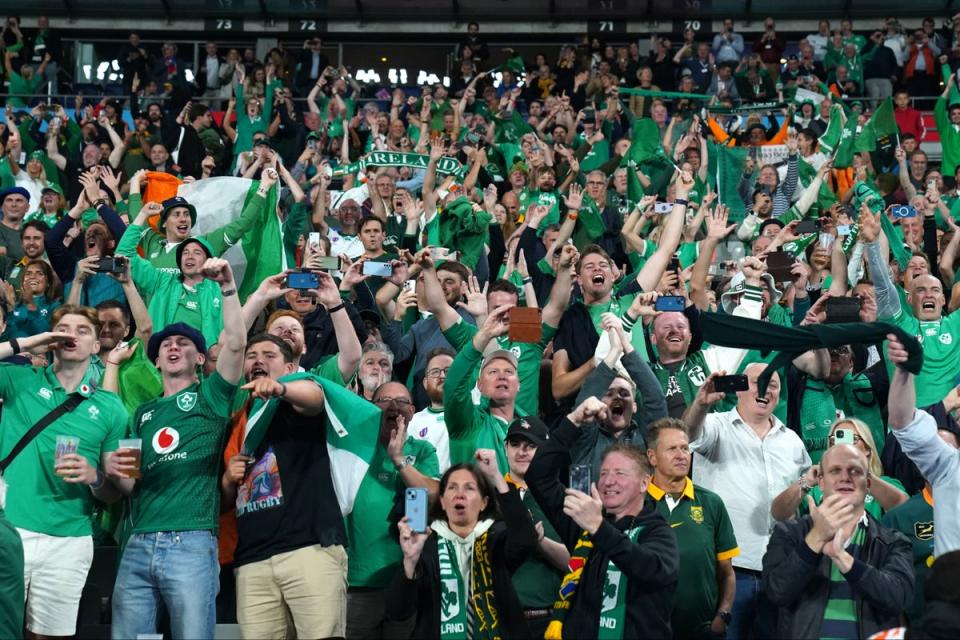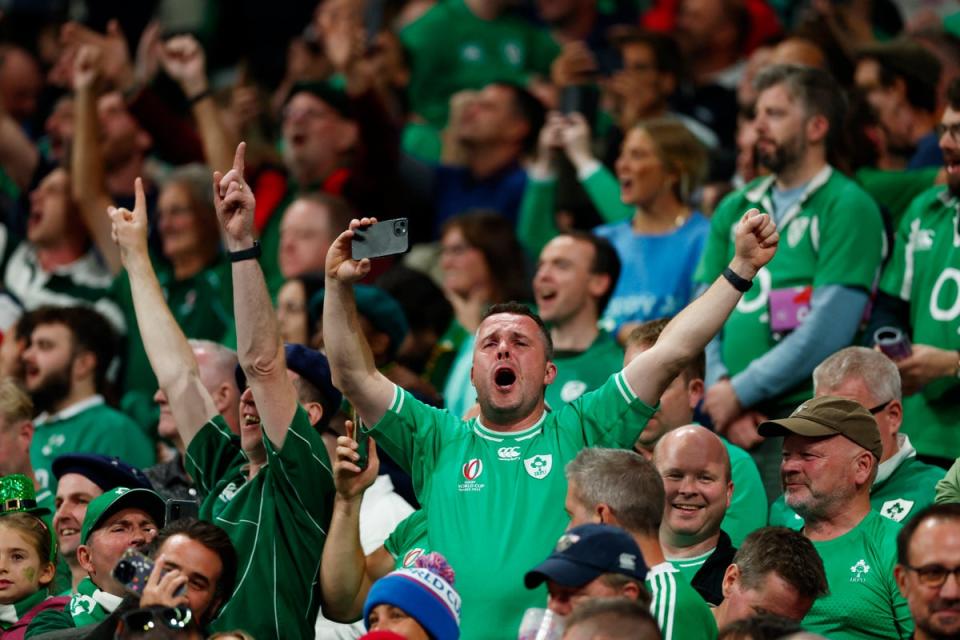Zombie: Why Ireland’s rugby anthem is causing controversy

Ireland‘s rugby fans have adopted the Cranberries’ 1994 hit ‘Zombie’ as an unofficial anthem – firstly at last year’s Rugby World Cup and likely at this spring’s Six Nations – but that decision has caused controversy.
During the World Cup, where Ireland topped their group before agonisingly losing a thrilling quarter-final to New Zealand as their unwanted record of never winning a knockout match at the tournament continued, ‘Zombie would blast out of stadium PA systems following the full-time whistle.
This is what happened following their brilliant 13-8 win over reigning champions South Africa in the pool stage of the tournament, as fans sung along with the anthem to create a spine-tingling moment.
Has Zombie ever sounded better. The character shown by this Irish team is inspirational. What a night pic.twitter.com/a2Cdx2kxOY
— Donal Lenihan (@LenihanDonal) September 23, 2023
Adopting a song to get the stadium rocking following a victory is hardly unique to Ireland, with French rugby fans belting out ‘Freed From Desire’ by Gala after their opening-night win over the All Blacks at the Stade de France.
But while ‘Zombie’ has been adopted due to its anthemic, sing-along qualities, the song’s history caused some debate and controversy back over the Irish Sea.
It was written by the Cranberries’ lead singer Dolores O’Riordan after a bomb planted in litter bins in the city centre of Warrington, Cheshire by the IRA in 1993 killed two children, Johnathan Ball, aged three, and Tim Parry, aged 12. The tragedy was given added poignancy by the fact that the two children were out shopping for Mother’s Day cards when they were caught up in the blasts.

O’Riordan, who was from Limerick in the west of Ireland, was touring the UK at the time and penned the protest song, including the lyrics “it’s not me, it’s not my family” to distance herself and other Irish people from the IRA’s actions.
“We were on a tour bus and I was near the location where it happened, so it really struck me hard,” O’Riordan said in an interview at the time. “I was quite young, but I remember being devastated about the innocent children being pulled into that kind of thing.”
In another interview, O’Riordan added: “I remember seeing one of the mothers on television, just devastated. I felt so sad for her, that she’d carried him for nine months, been through all the morning sickness, the whole thing and some… p****, some airhead who thought he was making a point, did that.”
Other lyrics in ‘Zombie’ include “What’s in your head?”, as O’Riordan furiously addresses the paramilitaries responsible for the Warrington Bombings and other acts of violence that defined the Troubles in Northern Ireland and the wider UK. It became identified as an ‘anti-IRA’ anthem and was a global phenomenon, topping the charts in eight countries and winning the Best Song Award at the 1995 MTV Europe Music Awards.
However, its origin as a protest song has led some to suggest it is inappropriate as an anthem for the Irish rugby team, who are one of the few sporting teams to represent both the Republic of Ireland and Northern Ireland. “An insult to republicans across Ireland and nationalists in the North,” wrote one person on Twitter/X.
‘Zombie’ first became a sporting anthem following the death of O’Riordan in 2018, as the hurling team from her home county of Limerick adopted it en route to winning that year’s All-Ireland Championship. Munster rugby team also played it in tribute to O’Riordan, with crowd reaction to its catchiness ensuring it became a staple after their games and has now transferred to the national team.

Plenty of public figures have defended its use, citing its anthemic nature as the reason it’s a perfect stadium celebration song.
On ‘Up Front with Katie Hannon’, ex-Ireland international Shane Byrne said: “Yes, there’s a meaning behind it. Yes, it was originally written as a protest song. But sometimes a good tune is just a good tune.”
Leo Varadkar, Ireland’s taoiseach, said he would sing Zombie if he were at the World Cup. “It’s a great song,” he told the radio station Newstalk. “I think it’s a song that we can all sing comfortably. It’s an anti-terrorism song. It’s not a nationalist or unionist song.”
Colum Eastwood, the leader of the Social Democratic and Labour party (SDLP) in Northern Ireland tweeted: “Zombie is an anti-war song written after the IRA killed 2 children in Warrington. Stop trying to make it something it isn’t. And stop pretending opposing IRA brutality is the same as supporting British brutality. Most of us opposed both.”
In 2023, it passed one billion streams on Spotify to highlight its enduring popularity and the remaining members of the Cranberries tweeted their delight at reaching the milestone.
“We’re thrilled to hear that “Zombie” has just exceeded a billion streams on @Spotify. Dolores would be over the moon! Thanks to all our fans for your incredible support,” wrote the band on Twitter/X.
The ‘Zombie’ dispute is similar to the controversy surrounding the Wolfe Tones song ‘Celtic Symphony’, which has become an anthem at some concerts and sporting occasions despite lauding the IRA in its lyrics with the line “ooh, ah, up the ’Ra”.
The Ireland women’s football team were fined and forced to apologise in 2022 after footage emerged on social media of them singing “ooh, ah, up the ’Ra” in the dressing room after their World Cup play-off win over Scotland.

 Yahoo Sports
Yahoo Sports 
